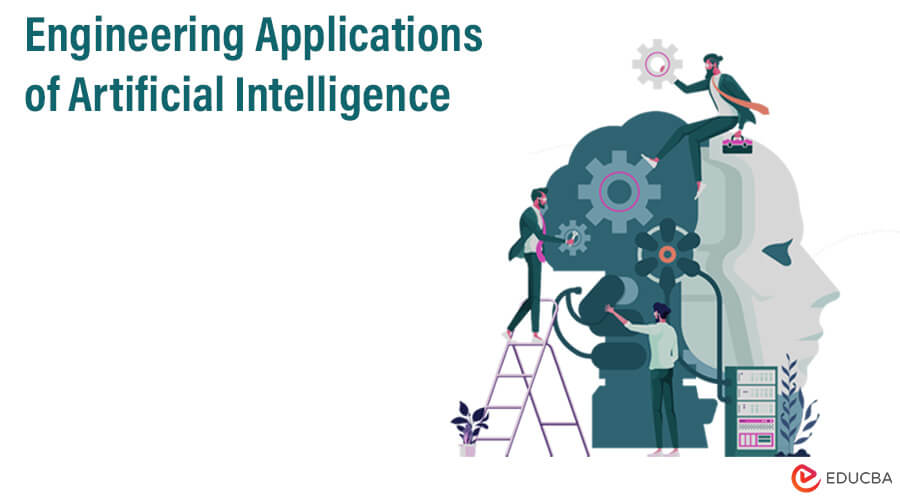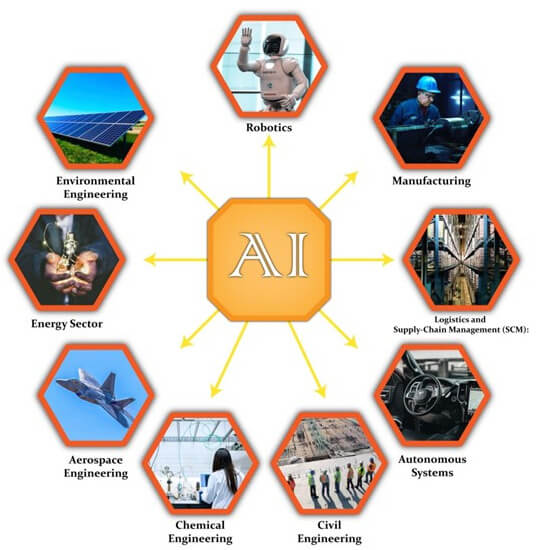Definition
Engineering Applications of Artificial Intelligence refer to the use of AI techniques and algorithms to solve complex engineering problems and improve the performance of engineering systems. This can include everything from using machine learning to optimize manufacturing processes and design new products to using natural language processing to improve human-machine communication in control systems. It’s the application of AI methodologies to design, develop, and optimize engineering systems.

What is Artificial Intelligence?
AI has progressed significantly since its initial days, with advances in innovation and research prompting the improvement of progressively modern frameworks. Today, AI is utilized in many ventures and applications, from medical care and finance to manufacturing and transportation. One of the most astonishing areas of AI research and improvement is in the field of engineering. Engineers are using AI to create new technologies, optimize existing systems, and solve complex problems in various industries. The potential applications of AI in engineering are vast, and the possibilities continue to expand as technology advances.
Key Takeaways
- AI prompts further developed proficiency, cost reserve funds, and new experiences that can be utilized to advance frameworks and cycles.
- AI can assist in reducing downtime and improving the proficiency of manufacturing and other industrial processes.
- We achieve improved safety and performance in various applications by integrating AI.
Engineering Applications of Artificial Intelligence
1. Robotics
- One of the most well-established areas of AI in engineering is robotics.
- Engineers have been using AI to control and program robots for various tasks such as manufacturing, inspection, and maintenance for several decades.
- Robotics is one of the most mature and well-established areas of AI. Engineers are using AI to create robots that can work alongside humans in factories, warehouses, and other industrial settings.
2. Manufacturing
In manufacturing, simulated intelligence can enhance production processes, improve quality control, and decrease costs.
- Engineers can use AI to analyze production data and identify patterns to improve manufacturing processes’ efficiency and effectiveness.
- Additionally, AI can be used to inspect and analyze products for defects, improve product consistency and optimize production processes.
3. Logistics and Supply-Chain Management (SCM)
- In logistics and supply chain management, AI can be utilized to upgrade transportation routes, foresee demands, and oversee stock.
- Engineers can use AI to analyze data from transportation networks, weather patterns, and other factors to predict delays and optimize routes.
- Additionally, AI can analyze demand patterns and predict future needs, allowing companies to manage inventory more effectively and reduce costs.
4. Autonomous Systems
- In the field of independent frameworks, artificial intelligence is utilized to foster self-driving vehicles, robots, and rockets.
- Engineers are using AI to create systems that can navigate, make decisions, and respond to changing conditions without human intervention.
- This can improve safety, efficiency, and performance in various applications.
5. Civil Engineering
- AI is also used in civil engineering to optimize the design and construction of buildings, bridges, and other infrastructure.
- Engineers can use AI to analyze data from simulations, sensor networks, and other sources to optimize the design and performance of structures.
- Additionally, AI can predict the behavior of structures under different loads and conditions, allowing engineers to make informed decisions about design and construction.
6. Aerospace Engineering
- In aerospace engineering, AI can be used to optimize the design and performance of aircraft and spacecraft.
- Engineers can use AI to analyze data from simulations and testing to improve aircraft’s aerodynamics and structural integrity.
- Additionally, AI can control and navigate autonomous aircraft, such as drones, which can be used for various tasks such as search and rescue, surveillance, surface testing, and delivery.
7. Energy Sector
- In the energy sector, AI can be used to optimize the performance of power plants, predict equipment failures, and manage the power grid.
- Engineers can utilize AI to analyze data from power plants and anticipate when equipment will probably fail, considering preventative maintenance to be scheduled.
- Additionally, AI can analyze data from the power grid and make predictions about demand, allowing power companies to manage the supply and distribution of electricity more effectively.
8. Chemical Engineering
- In the field of chemical engineering, AI can be used to optimize the performance of chemical processes, such as refining and petrochemical manufacturing.
- Engineers can use AI to analyze data from chemical processes and identify patterns that can be used to improve the efficiency and effectiveness of these processes.
- AI can be used to predict the behavior of chemical systems and make decisions based on this information, leading to improved safety and performance in chemical manufacturing.
9. Environmental Engineering
- In the field of environmental engineering, AI can be used to optimize the performance of environmental systems, such as water treatment plants, and predict environmental hazards.
- Engineers can use AI to analyze data from environmental systems and identify patterns that can be used to improve the efficiency and effectiveness of these systems.
- Additionally, AI can predict environmental systems’ behavior and make decisions based on this information, leading to improved safety and performance in environmental engineering.
Flow Chart
Benefits of Engineering Applications of Artificial Intelligence
- One of the key benefits of AI in engineering is its ability to process and analyse large amounts of data. Engineers can utilise AI to recognize examples and patterns in data that would be troublesome or unimaginable for humans to distinguish.
- Another important benefit of AI in engineering is its ability to make predictions. Engineers can utilise AI to anticipate when equipment or machinery is probably going to fail, taking into consideration preventative maintenance to be planned.
- Additionally, AI can be used to predict the behaviour of systems and make decisions based on this information.
Conclusion
In this article, Engineering Applications of Artificial Intelligence, we have learned, Artificial Intelligence assumes an undeniably significant part in engineering. Its ability to process and analyse large amounts of data, make predictions and perform tasks that would typically require human intelligence has led to a large number of uses in fields, for example, robotics, autonomous systems, predictive maintenance, process optimization, quality control, aerospace engineering, civil engineering, chemical engineering, environmental engineering, energy sector and many more. As technology keeps on propelling, AI’s expected utilization in engineering will keep on extending. The capacity to examine immense measures of data, identify patterns, predict failures, and optimise processes will lead to more efficient, cost-effective, and sustainable engineering solutions. As AI keeps on advancing, we can see significantly additional thrilling advancements in the field of engineering from now on.


